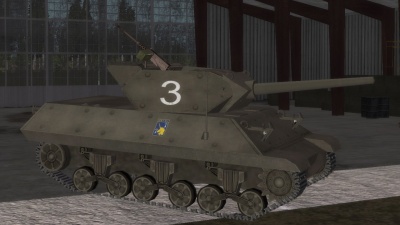M10 Wolverine
History
| 400px | |
| Main Gun Optics | |
| Specifications | |
| Designation | ? |
| Magnification | ? |
| Field of View | ? |
American pre-war armored vehicle doctrine called for tanks to accompany infantry and attack enemy troops while a specifically-designed anti-tank reserve would engage enemy tanks. Experience soon showed that towed anti-tank guns, while inexpensive, were too immobile for the fluid realities of tank warfare. The 3 in. Gun Motor Carriage M10, the Wolverine, or in British service the 3in SPM M10 was the first purpose-built replacement for anti-tank guns mounted on a halftrack or truck chassis (so-called "portee" guns) that US divisions employed in North Africa. Based on an M4 Sherman chassis, with a lightly armored, open-top turret, the M10 was successful due to its high-velocity 3 in. (76.2 mm) gun, which was based on the 3 in. M1918 anti-aircraft gun. Despite formal doctrine, the practicalities of combat usually meant that Wolverines generally served as general-purpose light tanks with extremely potent guns.
This vehicle is forever associated with Audie Murphy, the most decorated US soldier of World War II, who earned his Congressional Medal of Honor by holding off a German force of tanks and infantry by resolutely manning the 50 caliber machine gun atop a burning M10.
Game Play
The M10 is most successful when it’s used precisely as it was designed – as a motor carriage mounting an excellent anti-tank gun. Despite its tank-like appearance, it is not capable of trading sustained fire with enemy tanks. It has relatively thin armor that allows it to remain fast and maneuverable but not to slug it out with heavy tanks, and the slow rate of turret traverse makes it difficult to track a fast target at short range. Try to engage targets that are unaware of your presence at longer ranges where your powerful 3in high-velocity cannon can do the job at less risk to your own survival. The gun shoots flat and is capable of effective hits at long range so make an effort to engage well beyond the threat of enemy infantry (especially rifle grenadiers) and tanks. Shoot a few accurate shots and relocate - ambush tactics are the M10's most effective operational style. Pay particular attention to cover from aerial attack, as a strafing run that hits the roofless turret can end the M10’s operational life immediately. The open turret does, however, allow for excellent situational awareness.
The rear-facing 50 cal heavy machine gun provides basic AA defense, but your best tactic is to hide from from enemy aircraft.
While you do have generally thin armor, the front mantle and front turret are thick enough to take some return fire, particularly if the enemy is at long range. Go hull down behind a berm or obstacle to prevent the enemy from targeting your entire vehicle and pickle your opponents at very long range. Only the heavy Tiger will be a difficult target, because it can kill you from further than anything else you’ll encounter. Still, even the Tiger will fall to your superb gun and you can win a fight with one even at long ranges, provided you don’t let it shoot you first.
M10 Achilles
History
The desire to mount the 17 pounder on the M10 was governed by the degree of difficulty involved in mounting the 17 pounder on the tank itself. Luckily for the British, the initial batches of M10s had an easily modified gun mounting to facilitate the future replacement of the older 3 inch M7 gun with the newer 76 mm gun M1
| M10 Achilles | |
| Specifications | |
| Type | Medium Armored Fighting Vehicle |
| Armament | Main gun:QF 17 pounder On Turret (AA): cal. .50 Browning Machine Gun, M2, HB (flexible) |
| Gun Elevation | -10° to +19° |
| Turret Traverse | 360° (Hand) |
| Crew | 5 (Driver, Commander, Gunner, Loader, Machine Gunner) |
| Weight | 29,600kg |
| Top Speed | 48km/h |
| 400px | |
| Main Gun Optics | |
| Specifications | |
| Designation | ? |
| Magnification | ? |
| Field of View | ? |
